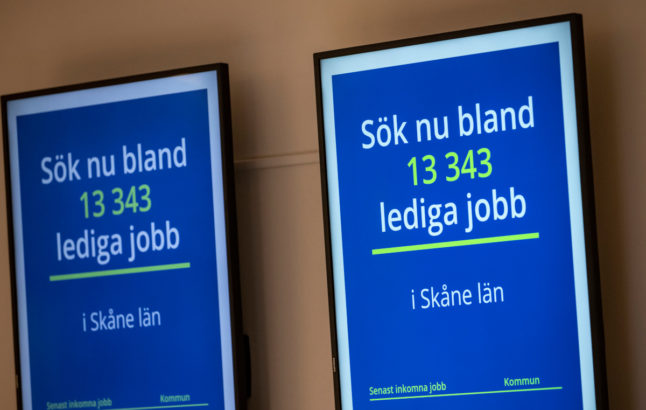Hej,
Ibrahim Idrees arrived in Sweden with high qualifications, having spent years working in finance in Syria and later Doha. In theory, companies should have been falling over themselves to employ him.
In reality, it was a struggle.
He tells The Local he applied for over 2,000 jobs without success, rarely even getting a call back for an interview, despite having received a job offer from banking giant Nordea while he was still living in Doha. He had turned that down, because he was then not yet sure about relocating to Sweden, and assumed in any case that he would be able to replicate that success once in his new country.
That turned out to be wrong.
“They look at you as a skilled professional when you apply from abroad, but when you’re here they look at you as an immigrant who’s seeking a job,” he says.
He’s not alone. In recent months there have been other stories reported in the Swedish media about foreign job seekers struggling so much to get a job that some even resorted to changing their name to get a foot on the career ladder in Sweden.
As if the general issue of discrimination wasn’t enough, the odds were also against Idrees at the time, as he tried to find work in an especially tough industry for foreigners. The CEO of Stockholm Dual Career Network, Maria Fogelström Kylberg, recently told The Local’s Sweden in Focus podcast that the finance sector is among the most conservative and difficult to break into for immigrants in Sweden.
In fact, a new exposé by Swedish news site Finansliv suggests that foreign-born bank clerks and accountants are more than eight times more likely than their native Swedish counterparts to be unemployed. The unemployment rate is seven times higher among foreign-born auditors, financial analysts and fund managers, and six times higher among bank, finance and insurance managers.
“That is a clear underperformance by the finance sector. It’s also ironic when we know that a lot of companies have skill shortages, and here you have a lot of people without a job,” Amanda Lundeteg, CEO at the Allbright Foundation, a diversity and inclusion organisation, told Finansliv.
“They do talent attraction quite well,” Fogelström Kylberg told The Local about Sweden’s drive to attract international talent. “But they forget about the retention. And that’s even more important. Because when people finally come here, you have to keep them. We can’t lose people, who settle down and suddenly it doesn’t work, and then they leave. That’s really bad, and expensive.”
Several industries in Sweden are complaining about a talent shortage. But when the talent is right here, readily available, and still not finding work, it points to a structural problem in the job market which has more in common with discrimination, even subconscious, than talent match-making.
For Idrees, the story ends well.
He instead realised a dream of becoming an entrepreneur and starting his own restaurant, and used his banking skills to apply for a loan to finance a hummus bar in Malmö, which is now thriving.
He has also been able to employ his parents and get them over to Sweden on work permits, something he would not have been able to do if he had eventually landed a full-time job.
But not every job-seeker can start their own business and his experience tells a broader story about just how hard it can be for immigrants to break into the job market, even if they’re highly skilled.
In other news
More than 50 people have died in workplace-related accidents in Sweden this year, the highest number in a decade. The tragic statistics became a talking point this week after two people were confirmed dead in accidents at Northvolt, and five people died in an elevator crash in Stockholm.
A flock of hungry jackdaws has begun eating the giant Christmas straw goat erected in Gävle, Sweden, raising the prospect of it getting severely damaged even if no one manages to set fire to it.
Sweden’s inflation fell faster than expected in November, new figures show. In the latest episode of Sweden in Focus, out now, we talk among other things about what it means for your mortgage.
It was the first year of a risky political experiment: Sweden’s right-wing bloc for the first time governed with the support of the far-right Sweden Democrats. Richard Orange has listed the 20 events that formed the Swedish political landscape in 2023.
The government this week announced a new plan to introduce a compulsory “Sweden course” for newly-arrived immigrants. We took a look at what could be included, and who would it affect?
A number of policies presented by the government and the Sweden Democrats over the last year threaten fundamental rights and freedoms, human rights organisation Civil Rights Defenders argues in a report presented this week.
But there’s good news too. A Swedish county governor’s reply to an eight-year-old girl’s request for a permit to own a unicorn (!) has warmed the hearts of a nation. It’s the kind of feel-good story we all need at Christmas, which is also the season… of vinterkräksjukan. Take care out there.
We got a lovely comment from a member on one of our articles this week. “The Local, in my opinion is the best media platform to have for us, new Swedes. Always has informative articles to better language skill and to assimilate into society. It is the only media platform I pay a fee to use all articles. Worth every kronor.” Thank you for your kind words – I’m happy to hear we’re useful.
How has The Local been useful to you in 2023?
Best wishes,
Emma Löfgren
Editor, The Local Sweden
PS: The Local is now on Threads! Follow us there.
Inside Sweden is our weekly newsletter for members that gives you news, analysis and, sometimes, takes you behind the scenes at The Local. It’s published each Saturday and members can receive it directly to your inbox, by going to your newsletter preferences.



 Please whitelist us to continue reading.
Please whitelist us to continue reading.
Member comments